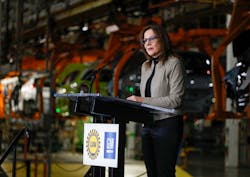Urged on by Trump, Ford and GM Rush to Start Making Ventilators
President Donald Trump caused consternation in Washington, Detroit and beyond when he tweeted on March 22 that he had given automakers the “go ahead” to start producing ventilators and other equipment desperately needed in the coronavirus pandemic.
No one seemed to know what this pronouncement meant.
What is clear, though, is that companies were already racing to try to determine how -- or if -- they could contribute. And that they recognize there will be no easy switch-over to manufacture something like a ventilator, which pumps oxygen into a Covid-19 patient’s lungs and removes carbon dioxide through a hose.
“You’re not going to take a car-assembly line and start making ventilators on it,” said Carla Bailo, chief executive officer of the Center for Automotive Research in Ann Arbor, Michigan. “It won’t make sense.”
Ford, General Motors and Tesla are being given the go ahead to make ventilators and other metal products, FAST! @fema Go for it auto execs, lets see how good you are? @RepMarkMeadows @GOPLeader @senatemajldr
— Donald J. Trump (@realDonaldTrump) March 22, 2020
But an industry with engineering might and a deep field of parts suppliers could help alleviate the stark shortage of ventilators, respirators and other devices across the U.S. Automakers are scrambling to see if they can orchestrate makeshift manufacturing of ventilators in as early as two weeks.
“It’s more or less getting an army together to get all the different parts and then you can set-up a makeshift assembly line,” Bailo said.
Sanitary Procedures
Automakers have 3D printers and the technical expertise to use them to make components. They have “clean rooms” in some plants that could be elevated to meet Food and Drug Administration standards, and Tyvek suits used in paint shops that could be re-purposed said a person familiar with the Detroit automakers’ preparations to help with ventilator production, who not to be identified revealing internal deliberations.
Swat teams have been assembled to tackle the question of how to proceed, Bailo said, adding that “the key will be making sure they have the right sanitary conditions.”
That’s one hurdle. “Ventilator manufacturing is a complex process that relies on a skilled and specialized workforce, an interconnected global supply chain and a rigorous regulatory regime to ensure patient safety,” said John Jordan, a spokesman for Medtronic Plc, which assembles ventilators in Galway, Ireland.
Just had a long engineering discussion with Medtronic about state-of-the-art ventilators. Very impressive team!
— Elon Musk (@elonmusk) March 21, 2020
Trump could, with the Defense Production Act, order the U.S. private sector to marshal its resources to attack the scarcity and provide financing via government contracts. There has been confusion about whether the president has actually done so.
For now, Trump said at a March 22 press conference, companies are responding without having to be forced.
“Well, we are using it now. The fact that I signed it, it’s in effect,” Trump said.
“The beauty is, they are calling us,” he continued, citing General Motors Co. and Ford Motor Co. and their interest in working on ventilators. “We have the threat of doing it if we need it. We may have to use it somewhere along the supply chain in a minor way.”
Presidential Powers
Trump critics denounced him for not using his presidential powers. Groups representing hospitals and medical professionals issued pleas for the act to be employed in full force.
“There are dwindling supplies,” the American Hospital Association, the American Medical Association and the American Nurses Association said in a March 21 letter to the president. “As Covid-‐19 continues to spread throughout the country, these supplies are urgently needed to care for our patients and communities.”
The administration appears to think this is not necessary. “The private sector’s response, to date, to his direction has been overwhelming, fulfilling government-identified needs faster than anyone thought possible,” a senior Trump official said Sunday, asking that he not be named.
In any event, the big automakers have indeed signaled that they are committed to an emergency effort. “It’s all hands on deck in many areas,” Bailo said. And there are some sweet spots on the line of what car production involves. “If you think about the hoses, there are hoses all over a car, supplied by various manufacturers, or even vacuum cleaner companies. They could start making the ventilator hoses.”
Hooking Up
GM is forming a collaborative venture with Ventec Life Systems Inc.. to help that company increase the production of ventilators. Ford said it is moving fast and has had preliminary discussions with the U.S. and U.K. governments, without offering specifics.
Medtronic, which has said it’s doubling its output capacity, has been in contact with electric-car maker Tesla Inc. “Medtronic will work with Tesla and others to try and solve this ventilator supply challenge,” Rob Clark, a spokesman for Dublin-based Medtronic, said by email last week, without providing details.
Elon Musk, the CEO of Tesla and SpaceX, tweeted last week that his companies “will make ventilators if there is a shortage.” He also said that “I think they probably won’t be needed.”
That seems clearly not to be the case. Michigan Governor Gretchen Whitmer said on March 22 on Fox News. “We anticipate an incredible need for ventilators, just as every other state is anticipating.”
OnMarch 22, Musk tweeted ventilators “should arrive within a few days,” without specifying what role, if any, his companies are playing in making them.
By Hailey Waller and Keith Naughton
